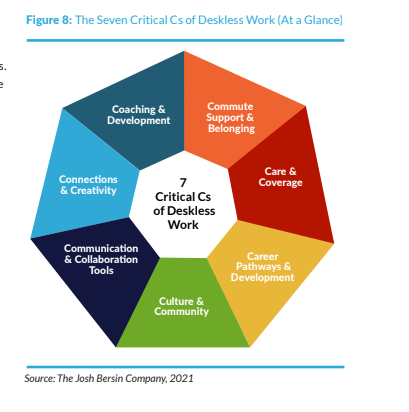7 ways to improve employee experience for deskless workers

Hybrid work is only for the select few who are lucky enough to be deskbound. But for the deskless workforce, remote or hybrid work remains a far-fetched dream. Attracting and retaining deskless workers is also impossible without a well-crafted and adaptable hybrid approach. The deskless experience needs to be designed in parallel with the hybrid work. Because companies that fail to prioritize deskless employees risk significant financial consequences and serious labor issues.
The Josh Bersin Company, in a new report titled The Big Reset Playbook: Deskless Workers focuses on the recommended practices needed to create optimal work experiences for “deskless” employees in retail, healthcare, manufacturing, hospitality, transportation, and other sectors.
CEO Josh Bersin stated, “Although the global deskless workforce makes up 80% of the working population, much of the recent media focus and research has been around remote and hybrid working arrangements available to relatively few employees. Because so little attention has been given to the working and personal needs of deskless employees, companies are now seeing mass resignations, unionization efforts, and scores of unfilled jobs.”
In fact, current research from multiple sources shows that hourly workers take the lead in quitting statistics. Research shows that deskless industries lack in employee experience. So what can organisations do stem this tide and create an excellent employee experiences for deskless workers?
Here are seven critical components of deskless work the report advocates that organisations focus on-
Enable human connections and time for creativity
Deskless workers are the closest to the customer, but a mere 6% of manufacturing companies and 7% of consumer companies design jobs to allow people time to rest, reinvent, and innovate, compared to 21% of technology firms and 29% of professional services companies.
Train managers to better coach deskless workers
Deskless workers need always-on feedback to perform their best, but managers are often disconnected from the actual work itself and therefore have limited insights. Managers also have many direct reports; in addition many companies don’t adequately support managers in developing and coaching people. The research shows that 11% of hospitality companies invest in developing leaders at all levels, compared to 75% of pharmaceutical companies.
Make the commute easy and establish belonging at work
Because remote work is not feasible for deskless workers, they need extra support with easy and safe commutes. A feeling of belonging is especially important in the light of the current resignation trends and labor shortages. Leaders need to demonstrate that they are actively listening to employees and taking actions as appropriate. Also important is the creation of schedules that employees can plan around.

Support the deskless worker's entire life
Work flexibility is often not an option for deskless workers, so they need backup for taking care of families and support for balancing finances. The vast majority live paycheck to paycheck, and only 13% of the 2.7 billion deskless workers worldwide have paid sick time. Three in four have worked while sick, and many are left without child or dependent care if a family member gets sick. In addition to expanding wellbeing benefits, companies should also be considering daily pay options and more predictable work schedules.
Help deskless workers build fulfilling careers
Deskless workers—especially those who may be in jobs ripe for automation—need pathways to future-proof careers. Many companies use internal talent marketplaces, but too often deskless workers don’t have easy access to the tools.
Build on the mission and create a deskless-first culture
A sense of belonging and community is critically important for deskless workers, yet many are often disconnected from the overall corporate mission and values when communication channels are designed for deskbound employees. A people-first approach means prioritizing investments in people at all levels and in all job roles. Research shows that companies that do that see higher financial performance and customer satisfaction.
Provide tools and services geared for mobile
HR and work tech is geared toward browser-based access for the deskbound employee: deskless workers are often left behind with no access to communication, tools, or resources.
While companies continue with hybrid work in the second winter season of the pandemic, in parallel, they need to focus on the 80% of employees around the world that have a work reality that is drastically different from their managers and design policies that are empathetic and keep their welfare in mind.















